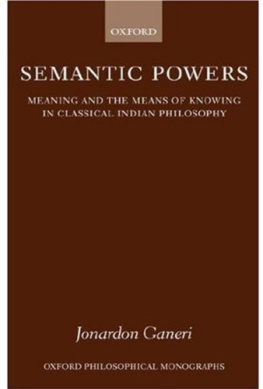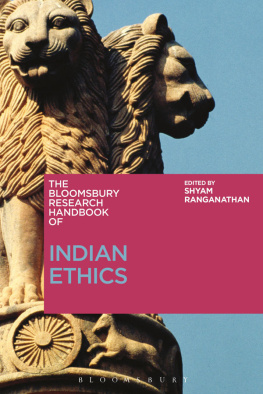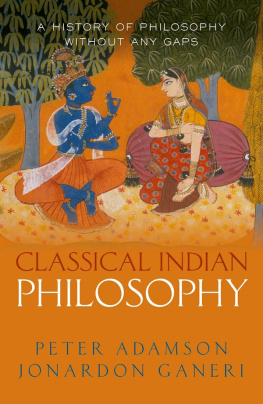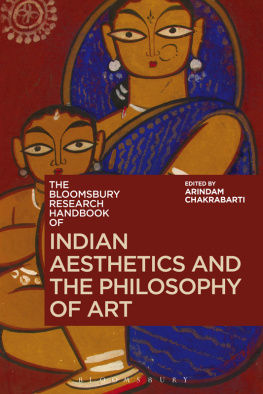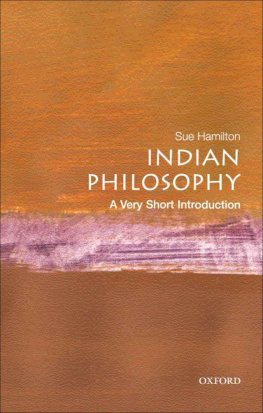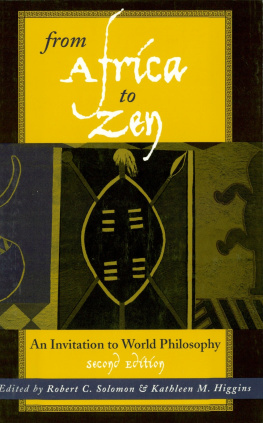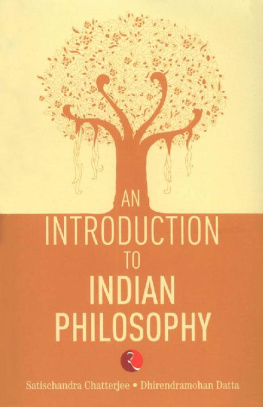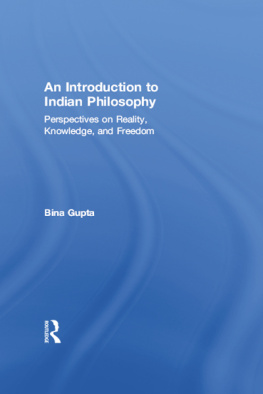THE OXFORD HANDBOOK OF
INDIAN
PHILOSOPHY
THE OXFORD HANDBOOK OF
INDIAN
PHILOSOPHY
Edited by
JONARDON GANERI


Oxford University Press is a department of the University of Oxford. It furthers the Universitys objective of excellence in research, scholarship, and education by publishing worldwide. Oxford is a registered trade mark of Oxford University Press in the UK and certain other countries.
Published in the United States of America by Oxford University Press
198 Madison Avenue, New York, NY 10016, United States of America.
Oxford University Press 2017
All rights reserved. No part of this publication may be reproduced, stored in a retrieval system, or transmitted, in any form or by any means, without the prior permission in writing of Oxford University Press, or as expressly permitted by law, by license, or under terms agreed with the appropriate reproduction rights organization. Inquiries concerning reproduction outside the scope of the above should be sent to the Rights Department, Oxford University Press, at the address above.
You must not circulate this work in any other form and you must impose this same condition on any acquirer.
CIP data is on file at the Library of Congress
ISBN9780199314621
eISBN9780190668396
CONTENTS
JONARDON GANERI
MATTHEW T. KAPSTEIN
ASHOK AKLUJKAR
JUSTIN E. H. SMITH
MARK SIDERITS
JAN WESTERHOFF
TOM J. F. TILLEMANS
CHRISTOPHER G. FRAMARIN
JONATHAN C. GOLD
MARIA HEIM
PIOTR BALCEROWICZ
MATTHEW R. DASTI
VINCENZO VERGIANI
JOHN TABER AND KEI KATAOKA
MONIMA CHADHA
SHALINI SINHA
BIRGIT KELLNER
CHARLES GOODMAN
RAMKRISHNA BHATTACHARYA
CHRISTIAN COSERU
DAN ARNOLD
PIOTR BALCEROWICZ
RAJAM RAGHUNATHAN
ISABELLE RATI
FRANOIS CHENET
MARIE-HLNE GORISSE
DONALD R. DAVIS, JR.
JONARDON GANERI
STEPHEN H. PHILLIPS
MICHAEL WILLIAMS
FRANCIS X. CLOONEY, SJ
ANDREW J. NICHOLSON
MICHAEL WILLIAMS
CHRISTOPHER MINKOWSKI
SHANKAR NAIR
AKEEL BILGRAMI
JONARDON GANERI
GOPAL GURU
NALINI BHUSHAN AND JAY L. GARFIELD
Ashok Aklujkar is a Sanskritist and Indologist. He is Professor Emeritus in the Department of Asian Studies at the University of British Columbia. There he taught courses in Sanskrit language and in the related mythological and philosophical literatures from 1969 to 2006. His published research is mostly in the areas of Sanskrit linguistic tradition and poetics. He has been a visiting professor at Hamburg, Harvard, Rome, Kyoto, Paris, Oxford, Marburg, and Pune. He is the author of the textbook Sanskrit: An Easy Introduction to an Enchanting Language. He received an honorary D.Litt from the Rashtriya Sanskrit Sansthan, New Delhi, in 2012.
Dan Arnold is Associate Professor of Philosophy of Religions at the University of Chicago Divinity School. He is the author of Buddhists, Brahmins, and Belief: Epistemology in South Asian Philosophy of Religion (Columbia University Press, 2005), and Brains, Buddhas, and Believing: The Problem of Intentionality in Classical Buddhist and Cognitive-Scientific Philosophy of Mind (Columbia University Press, 2012). He works chiefly on Indian Buddhist philosophy, which he engages in philosophically constructive ways.
Piotr Balcerowicz is Professor of Indian Philosophy and Oriental Studies at the University of Warsaw, Poland. He specializes in philosophical traditions of Asia and the West, with emphasis on Indian epistemology and non-Brahmanic philosophical schools. His latest books include Encyclopedia of Indian Philosophies, Vol. 14: Jaina Philosophy, Part II (co-edited with Karl Potter, Motilal Banarsidass, 2013), Encyclopedia of Indian Philosophies, Vol. 17: Jaina Philosophy, Part III (co-edited with Karl Potter, Motilal Banarsidass, 2014), Early Asceticism in India. jvikism and Jainism (Routledge, 2016), History of Classical Indian Philosophy. Part III: Non-Brahmanical Schoolsjvikism and Jainism (Wydawnictwo Akademickie Dialog, 2016).
Ramkrishna Bhattacharya is affiliated to the Pavlov Institute, Kolkata. He writes on the history of ideas, the history of science in India, the history of modern India, and philosophy (especially the Crvka/Lokyata system, materialism, and rationalism). His books include Studies on the Crvka/Lokyata (Anthem, 2009), and Emergence of Materialism in India (Acharya Nagarjuna University, 2013).
Nalini Bhushan is Professor of Philosophy at Smith College. She grew up in Chennai, South India, and received her Ph.D. at the University of Michigan, Ann Arbor. She regularly teaches courses in aesthetics; the philosophy of language, mind, and science; Friedrich Nietzsche; the varieties of global cosmopolitanism; and classical and contemporary Indian philosophy. Most recently she has co-edited an anthology entitled Indian Philosophy in English: From Renaissance to Independence (with Jay Garfield, Oxford University Press, 2011). She is currently co-authoring a book entitled Minds Without Fear: Philosophy in the Indian Renaissance (with Jay Garfield, Oxford University Press, 2017). This monograph examines the many ways in which the Indian philosophical tradition encounters secular and cosmopolitan modernity, while situated in the broad and complicated context of British colonial rule.
Akeel Bilgrami is the Sidney Morgenbesser Professor in the Philosophy Department, a Professor in the Committee on Global Thought, and the Director of the South Asian Institute, at Columbia University. His published works include Belief and Meaning (Blackwell, 1992), Self-Knowledge and Resentment (Harvard University Press, 2006), Secularism, Identity, and Enchantment (Harvard University Press, 2014). He has two short forthcoming books, Gandhis Integrity and What Is a Muslim?, and a longer book-length project on the relation between practical reason and agency.
Monima Chadha is Head of Philosophy of the Philosophy Program at Monash University. Her principal research area is the cross-cultural and interdisciplinary philosophy of mind, specifically classical Indian and contemporary Western philosophy of mind. She has published in leading academic journals like Philosophy East and West; Phenomenology and Cognitive Sciences; and Review of Philosophy and Psychology. Currently she is writing a book on the philosophical evolution of mind in Buddhism and its centrality to the doctrine in the absence of self.
Franois Chenet is Professor of Indian Philosophy and Comparative Philosophy at the University of Paris-Sorbonne (Paris-IV). His areas of interest are Indian philosophy, comparative philosophy (Western/Indian philosophy) and philosophy of religion. He has published (in French): The Indian Philosophy (Armand Colin, 1998); Psychogenesis and Cosmogony according to the Yoga-Vsiha (Publications of Collge de France n 67, 2 vols., 19981999); and The Time (Armand Colin, 2000). He has edited the Cahier de lHerne Nirva (LHerne, 1993) and Language Categories and Thought Categories in West and East (LHarmattan, 2005). He is the author of more than fifty research papers and book reviews.
Francis X. Clooney, SJ, is Parkman Professor of Divinity and Professor of Comparative Theology and, was the Director of the Center for the Study of World Religions, at Harvard University, 20102017. His primary areas of Indological scholarship are theological commentarial writings in the Sanskrit and Tamil traditions of Hindu India. He is the author of numerous articles and books, including


